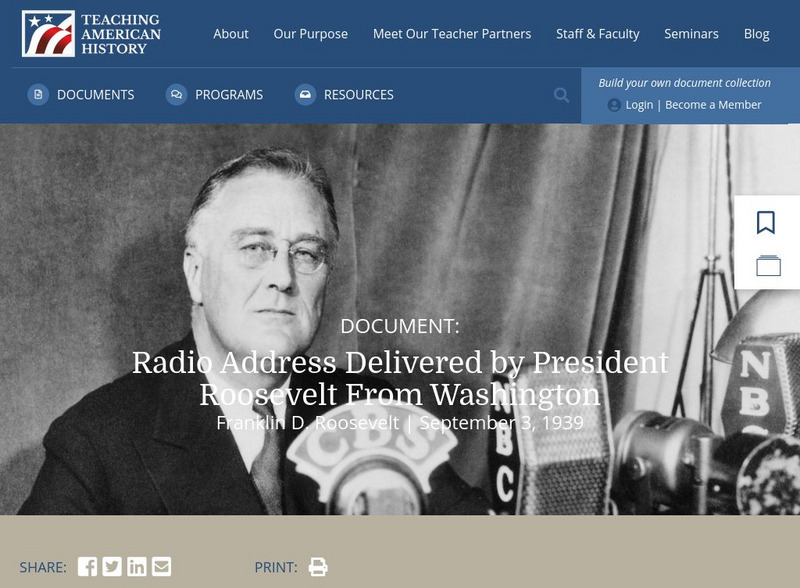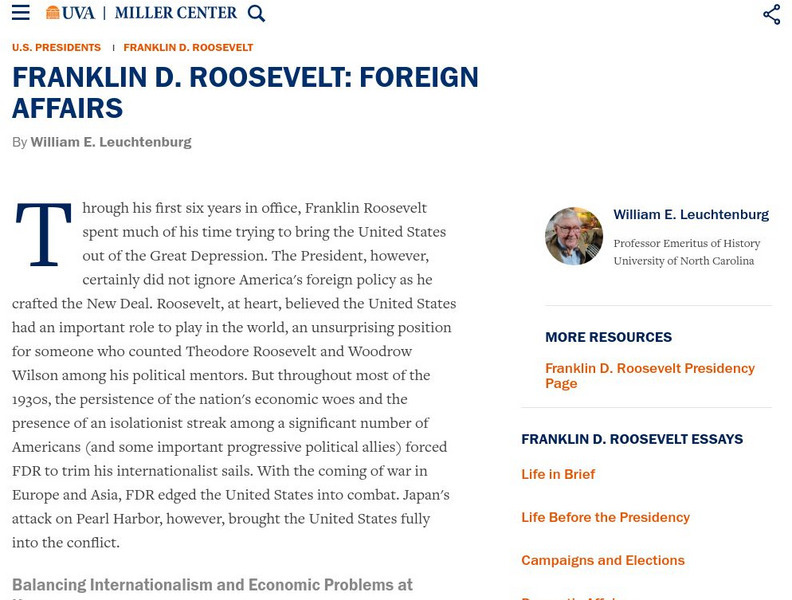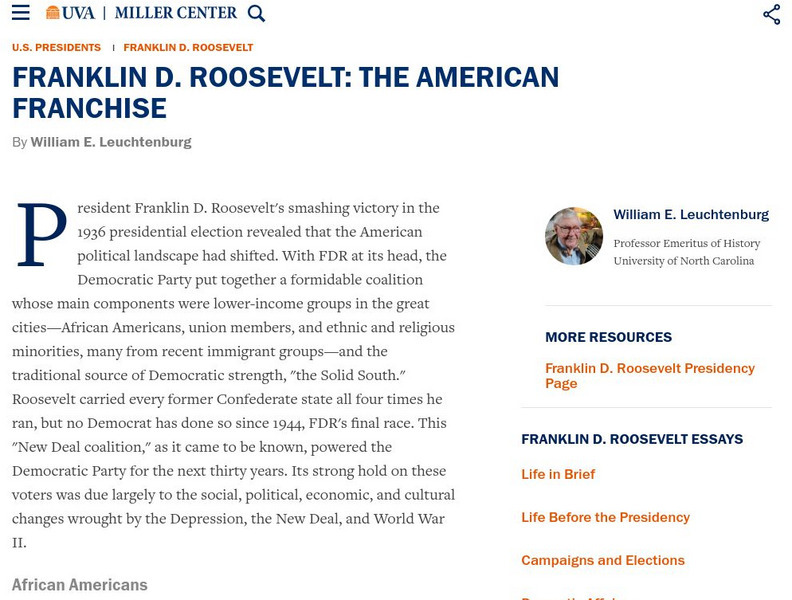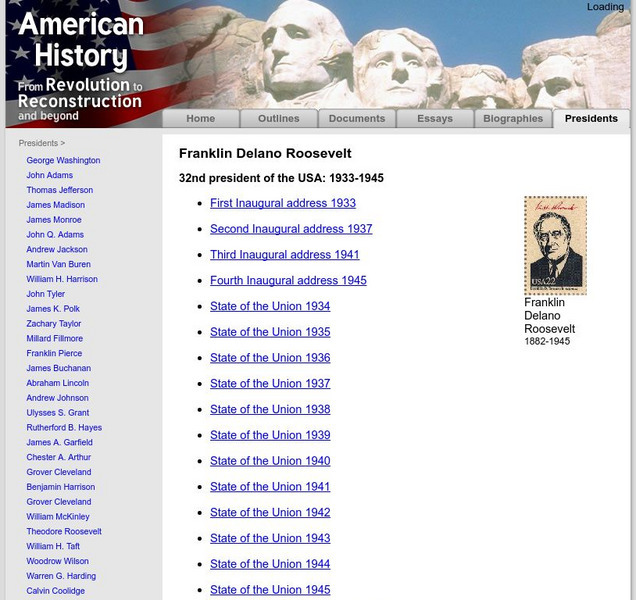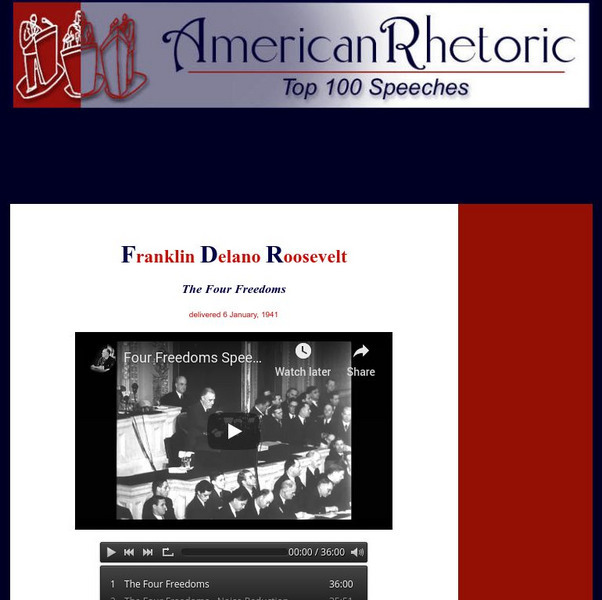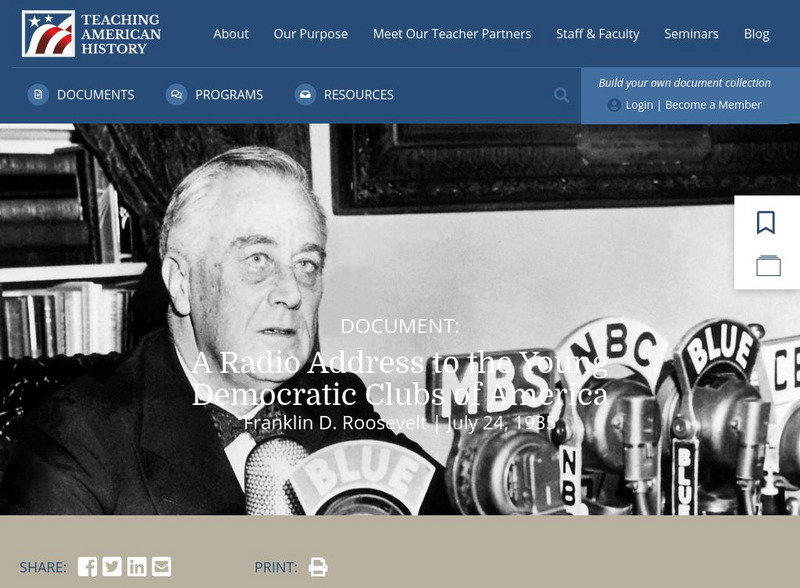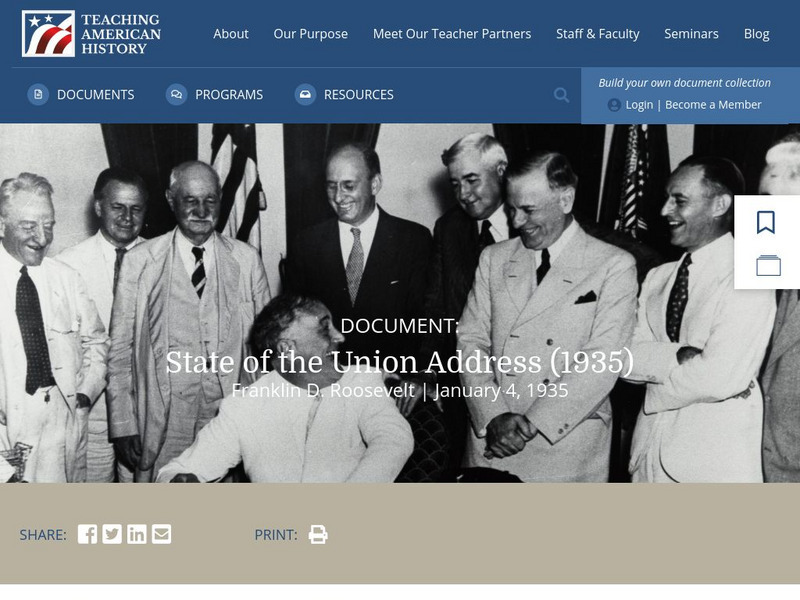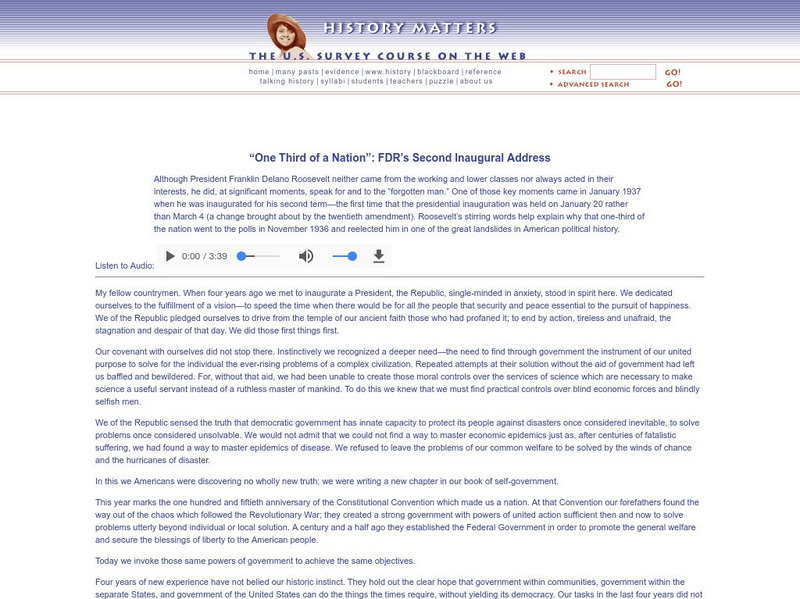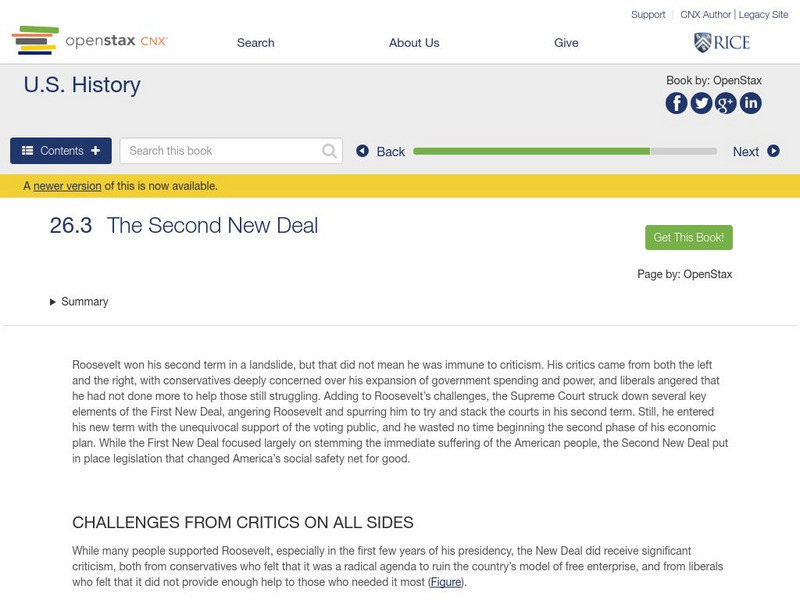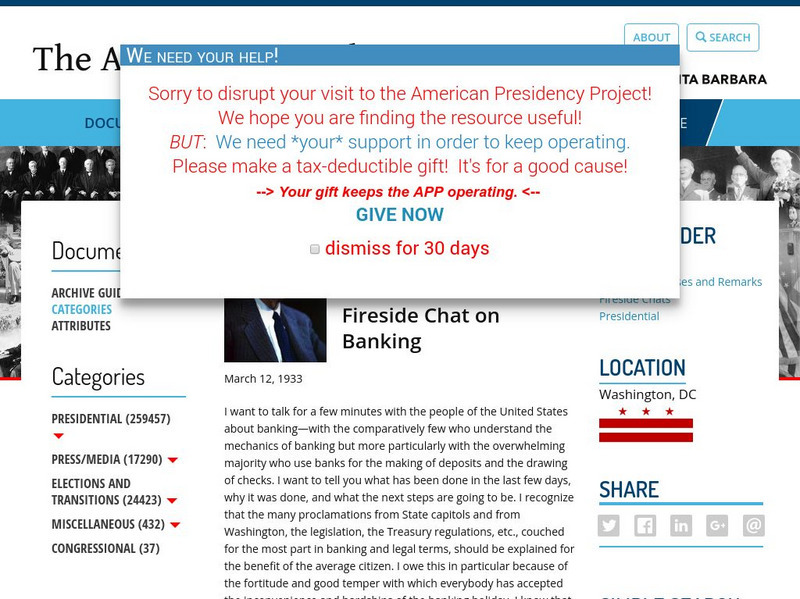Hi, what do you want to do?
University of Virginia
Miller Center at Uva: u.s. Presidents: Franklin Delano Roosevelt: Campaigns and Elections
Discussion and details of Franklin D. Roosevelt's campaigns and elections of 1932, 1936, 1940, and 1944.
American Rhetoric
American Rhetoric: Franklin Delano Roosevelt: First Inaugural Address
This is the text, audio, and video [7:04] of the swearing in and the first Inaugural Address of President Franklin Delano Roosevelt on March 4, 1933.
Teaching American History
Teaching American History: Fdr: Radio Address Delivered From Washington
A transcript of a radio address delivered from Franklin D. Roosevelt from Washington telling the nation that he hopes that the United States will not enter the war in Europe.
US National Archives
Docs Teach: "A Date Which Will Live in ": Two Versions of Fdr's Infamy Speech
This activity presents students with two versions of President Franklin D. Roosevelt's famous speech following the Japanese attack on Pearl Harbor-an earlier typewritten draft and his final reading copy. Students will read, analyze, and...
Other
Fdr Cartoon Archive: Franklin D. Roosevelt's Second Inaugural Address
Read Franklin Roosevelt's second inaugural address in which he assesses the previous four years and lays out his plan for the next.
Franklin D. Roosevelt Presidential Library & Museum
Franklin D. Roosevelt Presidential Library and Museum: Atlantic Charter
Read the background behind the Atlantic Charter and the beliefs of both Great Britain and the United States for international expectations after World War II. Find a draft of the charter with notes made by President Roosevelt.
University of Virginia
Miller Center at Uva: u.s. Presidents: Franklin Delano Roosevelt: Foreign Affairs
Scroll through this discussion of Franklin Roosevelt's attention to foreign policy during his several terms in office to "Confronting Germany and Japan" and "Descent into War." Here you will find out about the United States' position of...
American Presidency Project
American Presidency Project: Suspending Marketing Limitations on Sugar
Franklin D. Roosevelt's speech from 09/11/1939 on lifting the marketing quotas on sugar production in the United States due to the outbreak of war in Europe.
Smithsonian Institution
National Postal Museum: Mail to the Chief: Franklin Delano Roosevelt
An exhibition that celebrates FDR's love for stamps and stamp collecting.
University of Virginia
Miller Center at Uva: u.s. Presidents: Franklin Delano Roosevelt: The American Franchise
Informative discussion on FDR and the Democratic Party coalition that primarily consisted of African-Americans, union members, women, Mexican-Americans, and recent immigrants. This "New Deal" coalition provided power for the Democrats...
University of Groningen
American History: Presidents: Franklin Delano Roosevelt
This website provides links to all of FDR's inaugural addresses, State of the Union addresses and Pearl Harbor speech.
PBS
Presidential Links: President Roosevelt's Inaugural Address
Text of the speech that President Franklin D. Roosevelt gave during the March 4, 1933 inaugural address.
American Rhetoric
American Rhetoric: Franklin Delano Roosevelt: "The Four Freedoms"
This is the text and audio of President Franklin Roosevelt's speech to the 77th Congress entitled "The Four Freedoms" on January 6, 1941.
Library of Congress
Loc: Herblock's Presidents
Historically significant collection of political cartoons featuring U.S. Presidents from Library of Congress online teacher-student resources.
University of Texas at Austin
Dolph Briscoe Center for American History: Garner the Vice President (1933 1941)
As part of a larger biography, this part describes John Nance Garner's tenure as Franklin D. Roosevelt's vice-president for Roosevelt's first two terms. Find out about his importance to the enactment of the New Deal legislation.
PBS
Pbs: American Experience: Primary Resources: First Inaugural Address 1933
A transcription of President Franklin D. Roosevelt's First Inaugural Address delivered on March 4, 1933.
Teaching American History
Teaching American History: A Radio Address to the Democratic Clubs of America
On July 24, 1935, President Franklin D. Roosevelt delivered this radio address. He urges to keep the principles of America in the forefront and begs participation of the younger citizens to involve themselves in the decisions.
US Senate
U.s. Senate: Art & History: John Nance Garner, 32nd Vice President
From the official site of the U.S. Senate, this biography of John Nance Garner, at first a candidate running for the Demcratic nomination for president, and becoming the candidate for Vice-President for Franklin D. Roosevelt in the 1932...
Teaching American History
Teaching American History: State of the Union Address 1935
President Franklin D. Roosevelt's State of the Union Address delivered in 1935.
University of Virginia
Miller Center at Uva: u.s. Presidents: Franklin Delano Roosevelt: Henry A. Wallace
Biographical sketch of Henry A. Wallace who held a variety of positions in the Roosevelt administration, including Secretary of Agriculture, Secretary of Commerce and Vice-President.
Curated OER
History Matters: "One Third of a Nation": Fdr's Second Inaugural Address
Read and listen to Franklin D. Roosevelt's second inaugural address where he points out the problems and progress made in his previous four years. He goes on to lay out his plans for his next term.
Digital History
Digital History: Franklin Roosevelt and the Depression [Pdf]
After reading brief biographical information about Franklin Roosevelt, find out what he did immediately upon being sworn in as president in 1933. Find out about the legislation that aimed to encourage trust in banks, and the legislation...
OpenStax
Open Stax: Franklin Roosevelt and the New Deal 1932 1941: The Second New Deal
Examines the legislation enacted under Roosevelt's Second New Deal, and how the New Deal as a whole affected women, African Americans, and Native Americans.
American Presidency Project
American Presidency Project: Franklin D. Roosevelt: Fireside Chat on Banking
Read the text of Franklin Roosevelt's fireside chat on March 12, 1933, just days after he was inaugurated for first term, in which he explained the reasoning behind his declaration of a bank holiday.







